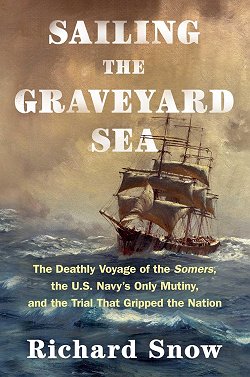First Line: On the evening of December 14, 1842, the United States brig-of-war Somers sailed through the Narrows of New York Harbor.
1842. In a training voyage gone drastically wrong, the USS Somers arrived in Brooklyn Harbor to report an attempted mutiny. Some of the mutineers were being held under guard, but three had been hanged-- one of whose father was the Secretary of War.
Months of accusations and counter-accusations led to a highly public court martial that put the commander of the Somers on trial for his life.
~
Sailing the Graveyard Sea details an interesting chapter in U.S. naval history. Was there really a mutiny aboard the USS Somers, or did Commander Alexander Mackenzie overreact? Acting Midshipman Philip Spencer, son of the Secretary of War, was spoiled and self-indulgent and much too in love with a book detailing the history of pirates... but was he really the ringleader of a mutiny? Fortunately, some good did come from this entire mess: the public was so disgusted with Mackenzie's training cruise that the U.S. Naval Academy was founded in Annapolis.
Author Richard Snow's research is exhaustive, and I did learn a great deal; however, his writing style-- cut-and-dried, and stuffed to the gills with dusty facts-- was a chore to read and I often found my attention wandering. All in all, lots of excellent information on this chapter of U.S. naval history, but if you like your historians to craft a book that reads like the best fiction, you'd be better off going elsewhere.
Sailing the Graveyard Sea: The Deathly Voyage of the Somers, the U.S. Navy's Only Mutiny, and the Trial that Gripped the Nation
by Richard Snow
eISBN: 9781982185466
Scribner © 2023
eBook, 304 pages
Non-Fiction, Standalone
Rating: C+
Source: Net Galley

You just highlighted one of my biggest pet peeves with non-fiction books (and, actually, with textbooks, too), Cathy. Facts do not have to be boring. If we tell history as the story it is, it's far more engaging. I don't mean you make up facts, of course. I just mean tell the facts as you tell a story.
ReplyDeleteI agree completely, but that doesn't surprise you one little bit.
DeleteI'm certain that I read a fictional account based on this event several years ago, although I can't now bring the title up. I don't think this one will make it onto my "to be read" list though!
ReplyDeleteIsn't it nice to read one of my reviews and NOT add it to your TBR list? ;-)
DeleteIt's a real shame that so many good historians are historically bad writers.
ReplyDeleteYes, it is. I wonder if they're one of the reasons why history keeps repeating itself?
DeleteThis is a naval history event that had not made it onto my radar yet. Between your review and the implied importance of the trial that resulted (judging from the title), this is not the book for me to use to learn any more about it.
ReplyDeleteI knew you and I shared an interest in naval history, Kate.
DeleteNaval history is not a very interesting subject for the majority. So thank you for the review.
ReplyDeleteYou're welcome, Mystica. I love history, I love the exploration/travel aspect, and I have a grandfather, father, and husband who were all in the Navy. Even though I know most people aren't interested in the subject, I can't resist sharing for the few who do.
DeleteI love reading nonfiction about places and events that I've never heard about, but I don't love it when the writing is dry and dense and hard to plow through. This event in history sounds interesting, but I don't think I'd make it through the book.
ReplyDeleteIt was touch-and-go for me a few times, Lark.
Delete